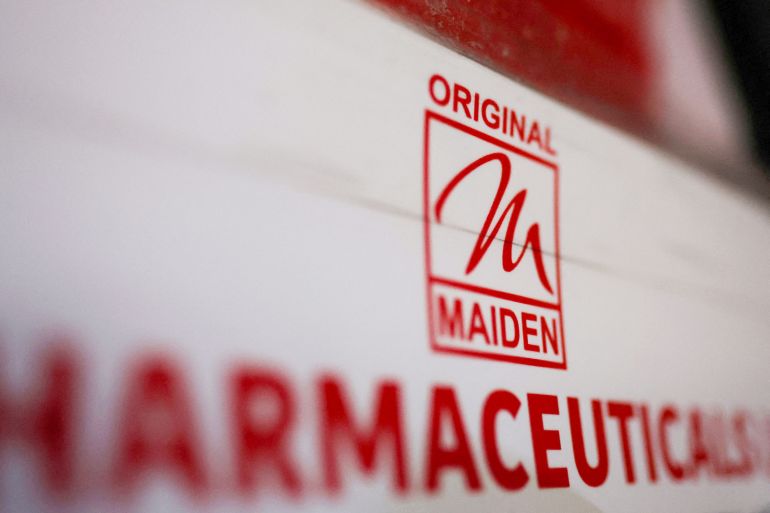India finds serious breaches, halts production over Gambia deaths
WHO report found the Maiden Pharmaceuticals medicine may be linked to the deaths of dozens of children in the African nation.

Indian health authorities said on Wednesday they had halted all production of New Delhi-based Maiden Pharmaceuticals after a WHO report that its cough and cold syrups exported to The Gambia may be linked to the deaths of dozens of children there.
Known as a “pharmacy of the world”, India supplies 45 percent of all generic medicines to Africa.
Keep reading
list of 3 itemsIndia-made cough syrups may be tied to 66 deaths in Gambia: WHO
The Gambia probes child deaths linked to paracetamol syrup
The deaths of 69 children in The Gambia – one of the worst such incidents involving drugs from India – have come as a blow to the industry whose exports more than doubled in the last decade to hit $24.5bn last fiscal year.
Indian authorities inspected Maiden’s main factory in the state of Haryana four times this month and said they suspended all its manufacturing activities on Tuesday after finding that the firm had been manufacturing and testing drugs in violation of rules “across its manufacturing and testing activities”.
“In view of the seriousness of the contraventions observed during the investigation and its potential risk to the quality, safety and efficacy of the drug being produced, all the manufacturing activities of the firm is being stopped with immediate effect,” said in an order by federal and Haryana state drug regulators.
Maiden executive Naresh Kumar Goyal declined to comment. He told Reuters news agency last week the company was trying to find out from its buyer what had happened in The Gambia.
The drugs exported to The Gambia were made by Maiden in a single batch in December last year at its main factory in Haryana’s Sonipat district, about 40km (25 miles) north of New Delhi, with a use-by-date of November 2024, the order said.
A top Indian health official, who declined to be named, said the government would not tolerate wrongdoing, but that it was important to find out what exactly happened in The Gambia. He denied allegations by some critics that health regulations in India, especially at the level of states, were lax.
The government has formed a committee of four experts that will advise further action after “examining and analysing adverse event reports, causal relationship and all related details shared by the WHO (World Health Organization)”.
Indian laws allow for imprisonment and fines for selling spurious drugs.
But the source said the WHO had yet to share any report establishing a direct link to the deaths with the Indian-made medicines.
WHO Assistant Director-General Mariângela Simão told a virtual news conference it was working closely with Indian authorities to investigate Maiden’s cough and cold syrups.
She said the WHO’s conclusion about the deaths being linked to Maiden’s medicines was based on an analysis of several samples of medicines that were used by hospitalised children.
Health alert
Maiden said on its website that it has an annual production capacity of 2.2 million syrup bottles, 600 million capsules, 18 million injections, 300,000 ointment tubes and 1.2 billion tablets at its Haryana factories. It said it has two other factories in the state apart from the main one.
The WHO issued a medical product alert last week asking regulators to remove Maiden goods from the market.
The UN health agency said that laboratory analysis of four Maiden products – Promethazine Oral Solution, Kofexmalin Baby Cough Syrup, Makoff Baby Cough Syrup and Magrip N Cold Syrup – had “unacceptable” amounts of diethylene glycol and ethylene glycol, which can be toxic and lead to acute kidney injury.
News website Moneycontrol earlier quoted the Haryana drugs controller as saying in a report that Maiden did not perform quality testing of propylene glycol, diethylene glycol and ethylene glycol, while certain batches of propylene glycol did not have the manufacturing and expiry dates.
Diethylene glycol and ethylene glycol are used as cheaper alternatives in some pharmaceutical products to glycerine, a solvent or thickening agent in many cough syrups.
Gambian police, in a preliminary investigation report on Tuesday, said that the deaths of 69 children from acute kidney injury were linked to the cough syrups made in India and imported via Atlanta-based Atlantic Pharmaceuticals. Reuters has been unable to determine where the company is based.
The firm is distinct from Atlanta-based Atlantic Pharmaceuticals, Inc, whose president Anthony Soscia told Reuters by email that his company “does not import or export any pharmaceuticals.”
The cough syrups had been approved for export only to The Gambia, India said, although the WHO says they may have gone elsewhere through informal markets.
Indonesia said on Wednesday it would investigate cases of acute kidney injury which has caused the deaths of more than 20 children in its capital Jakarta this year, but that there was no connection with the cases in The Gambia.